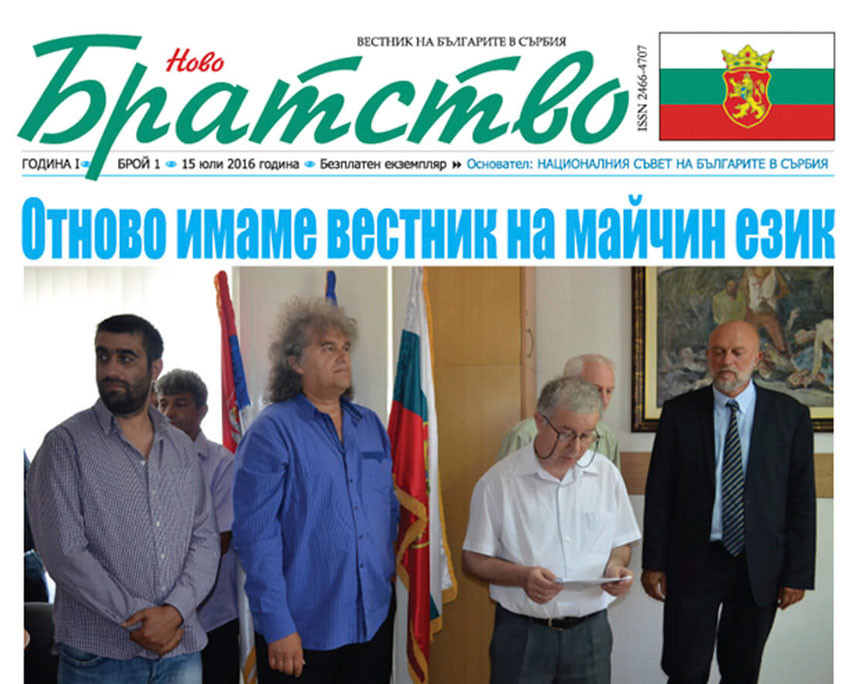Data from the Statistical Institute of Serbia from 2011 shows that a little over 18,000 people have identified themselves as Bulgarians in that country. The largest Bulgarian minority in Serbia is found in the eastern parts of Bulgaria’s western neighbour - mainly the municipalities of Bosilegrad and Tsaribrod. In recent years, due to the increasing economic migration, Bulgarians there have become less and less numerous, says Mila Vasov, director of the Novo Bratstvo (New Brotherhood) publishing house and editor-in-chief of the eponymous newspaper published in Bulgarian in the town of Niš.
"The newspaper has existed since 1949, and until two years ago it came out as a supplement to the Pirotska Svoboda (Pirot Freedom) newspaper and for about a year - as an independent Bulgarian newspaper entitled “Svoboda” (Freedom), i.e. we have existed since 1949 to the present day. There was an interruption in its publishing between 2012 and 2016. Initially, the newspaper was a weekly, and now, due to lack of funds, it is published every two weeks. One part of it is dedicated to life in the municipalities of Tsaribrod and Bosilegrad, and the other one to culture. We present the body of creative work of Bulgarians in Serbia. From 1960 to 2012 also the children's magazine "Drugarche" (Little Friend) was published, and from 1964 to 2012 - a large literary publication. Over the years, we have had a wealth of publishing activities funded by former Yugoslavia. During this time more than 150 books were printed in Bulgarian. Now we have the newspaper only."

Mila Vasov believes that the main role of the Bulgarian media in Serbia should be to unite all Bulgarians living there.
"The main characteristic of the Bulgarian minority here is that it is divided. We do not act as one organism. All the media call on us to work together in co-operation, but in practice we are divided. Why is that? There are a number of reasons…"
The region with Bulgarian population in neighbouring Serbia are defined in Bulgaria as "the western outlands" - a term established after the First World War and referring to the territories detached from the Bulgarian state and annexed to the Kingdom of Serbs, Croats and Slovenes under the Neuilly Peace Treaty signed on November 27, 1919. Most of these territories fall in Serbia and another part in present-day North Macedonia.
"In fact, about 18,000 Bulgarians live in Serbia. Currently, the education process in part of the primary schools in the western outlands is conducted in Bulgarian, in other places it is mixed. During socialism the education was entirely in Bulgarian, later children had the right to choose which language to study. However, after graduating, most of them continue their education in Sofia."
English Rossitsa Petcova
Photos: novo.bratstvo.rsThe Martenitsa Festival was held in Brussels f or the third consecutive year . Cultural organizations from Bulgaria, Romania and Moldova presented their country's traditions related to the "Baba Marta" holiday, which heralds spring. The initiative..
Measurement equipment installed at the Bulgarian Antarctic base "St. Kliment Ohridski" has been collecting valuable data on solar activity and its relation to the Earth's magnetic field for two months. The research is part of Bulgaria's first polar..
558 Bulgarians aged 18, selected from 1,785 applicants, will be able to embark on their dream journey by train across Europe, learn from other cultures and build new friendships. They have been selected to receive a free travel pass through the..
Exactly a month after the Bulgarian National Radio solemnly celebrated its 90th anniversary, history continues its dialogue with us, its authors. With a..

+359 2 9336 661
